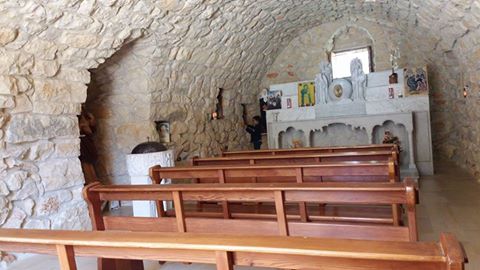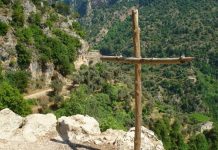
قَالَ يَسُوع للمشلول: «قُمِ ٱحْمِلْ فِرَاشَكَ وٱمْشِ». وفِي الحَالِ شُفِيَ الرَّجُل، وحَمَلَ فِرَاشَهُ، وصَارَ يَمْشِي
إنجيل القدّيس يوحنّا05/من01حتى16/:”كَانَ عِيدٌ لِليَهُود، فَصَعِدَ يَسُوعُ إِلى أُورَشَليم. وفي أُورَشَليم، عِنْدَ بَابِ الغَنَم، بِرْكةٌ يُقَالُ لَهَا بِٱلعِبْرِيَّةِ بَيْتَ حِسْدا، ولَهَا خَمْسَةُ أَرْوِقَة، يَضْطَجِعُ فِيهَا حَشْدٌ مِنَ المَرْضَى، مِنْ عُمْيَانٍ وعُرْجٍ ومَشْلُولِين، وهُمْ يَنْتَظِرُونَ فَوَرَانَ المَاء، لأَنَّ مَلاكَ الرَّبِّ كَانَ يَنْزِلُ إِلى البِرْكَةِ أَحْيَانًا، فَيَتَحَرَّكُ مَاؤُهَا. وكَانَ الَّذِي يَنْزِلُ أَوَّلاً، بَعْدَ تَحَرُّكِ المَاء، يُشْفَى مَهْمَا كَانَتْ عِلَّتُهُ. وكَانَ هُنَاكَ رَجُلٌ مَرِيضٌ مُنْذُ ثَمَانٍ وثَلاثِينَ سَنَة. ورَآهُ يَسُوعُ مُضْطَجِعًا، وعَلِمَ أَنَّ لَهُ زَمَنًا طَويلاً عَلى تِلْكَ الحَال، فَقَالَ لَهُ: «أَتُرِيدُ أَنْ تُشْفَى؟». أَجَابَهُ المَرِيض: «يَا سَيِّد، لَيْسَ لِي أَحَدٌ يُلقِينِي في البِركَةِ عِنْدَمَا يَتَحَرَّكُ المَاء. وفيمَا أَنَا أُحَاوِلُ النُّزُول، يَنْزِلُ قَبْلي آخَر». قَالَ لَهُ يَسُوع: «قُمِ ٱحْمِلْ فِرَاشَكَ وٱمْشِ». وفِي الحَالِ شُفِيَ الرَّجُل، وحَمَلَ فِرَاشَهُ، وصَارَ يَمْشِي. وكَانَ ذلِكَ اليَومُ سَبْتًا. فَقَالَ اليَهُودُ لِلْمُعَافَى: «إِنَّهُ سَبْت، فَلا يَجُوزُ لَكَ أَنْ تَحْمِلَ فِرَاشَكَ». فَأَجَابَهُم: «ذَاكَ الَّذي شَفَانِي قَالَ لِي: إِحْمِلْ فِرَاشَكَ وٱمْشِ». سَأَلُوه: «مَنْ هُوَ الإِنْسَانُ الَّذي قَالَ لَكَ: إِحْمِلْ وٱمْشِ؟». وكَانَ المُعَافَى لا يَعْلَمُ مَنْ هُوَ، لأَنَّ يَسُوعَ قَدِ ٱبْتَعَدَ عَنِ الجَمْعِ المُحْتَشِدِ فِي ذلِكَ المَكَان. بَعْدَ ذلِكَ، وَجَدَهُ يَسُوعُ في الهَيْكَل، فَقَالَ لَهُ: «هَا أَنْتَ قَدْ شُفِيت، فَلا تَعُدْ إِلى الخَطِيئَةِ لِئَلاَّ يُصِيبَكَ مَا هُوَ أَسْوَأ». مَضَى الرَّجُلُ وأَخْبَرَ اليَهُودَ أَنَّ يَسُوعَ هُوَ الَّذي شَفَاه. ولِذلِكَ صَارَ اليَهُودُ يَضْطَهِدُونَ يَسُوع، لأَنَّهُ كَانَ يَفْعَلُ ذلِك يَوْمَ السَّبْت.
Jesus said to the Sick man, ‘Stand up, take your mat and walk.’At once the man was made well, and he took up his mat and began to walk
Saint John 05/01-16/:”After this there was a festival of the Jews, and Jesus went up to Jerusalem. Now in Jerusalem by the Sheep Gate there is a pool, called in Hebrew Beth-zatha, which has five porticoes. In these lay many invalids blind, lame, and paralysed. One man was there who had been ill for thirty-eight years. When Jesus saw him lying there and knew that he had been there a long time, he said to him, ‘Do you want to be made well?’ The sick man answered him, ‘Sir, I have no one to put me into the pool when the water is stirred up; and while I am making my way, someone else steps down ahead of me.’ Jesus said to him, ‘Stand up, take your mat and walk.’At once the man was made well, and he took up his mat and began to walk. Now that day was a sabbath. So the Jews said to the man who had been cured, ‘It is the sabbath; it is not lawful for you to carry your mat.’ But he answered them, ‘The man who made me well said to me, “Take up your mat and walk.” ’They asked him, ‘Who is the man who said to you, “Take it up and walk”?’Now the man who had been healed did not know who it was, for Jesus had disappeared in the crowd that was there. Later Jesus found him in the temple and said to him, ‘See, you have been made well! Do not sin any more, so that nothing worse happens to you.’ The man went away and told the Jews that it was Jesus who had made him well. Therefore the Jews started persecuting Jesus, because he was doing such things on the sabbath.”
لأَنَّنَا لا نَنْظُرُ إِلى مَا يُرَى، بَلْ إِلى مَا لا يُرَى، فَمَا يُرَى هوَ مُوَقَّت، ومَا لا يُرَى أَبَدِيّ.
رسالة القدّيس بولس الثانية إلى أهل قورنتس 04/16-18.05,01-05.10/:يا إخوَتِي، لِذَلِكَ لا تَضْعُفُ عَزِيْمَتُنَا. فمَعَ أَنَّ إِنْسَانَنَا الظَّاهِرَ يَنْحَلّ، فَإِنْسَانُنَا الدَّاخِلِيُّ يَتَجَدَّدُ يَوْمًا بَعْدَ يَوْم؛ لأَنَّ ضِيقَنَا الخَفِيفَ العَابِرَ يُعِدُّ لَنَا ثِقْلَ مَجْدٍ أَبَدِيٍّ لا حَدَّ لَهُ. لأَنَّنَا لا نَنْظُرُ إِلى مَا يُرَى، بَلْ إِلى مَا لا يُرَى، فَمَا يُرَى هوَ مُوَقَّت، ومَا لا يُرَى أَبَدِيّ. ونَحْنُ نَعْلَمُ أَنَّهُ إِذَا هُدِمَ بَيْتُنَا الأَرْضِيّ، أَيْ جَسَدُنَا الَّذي هُوَ أَشْبَهُ بِالخَيْمَة، فَلَنَا مَسْكِنٌ مِنَ ٱلله، بَيْتٌ لَمْ تَصْنَعْهُ الأَيْدِي، أَبَدِيٌّ في السَّمَاوَات. ومَا دُمْنَا في هذِهِ الحَال، فَنَحْنُ نَئِنُّ مُتَشَوِّقِينَ أَنْ نَلْبَسَ فَوْقَ بَيْتِنَا الأَرْضِيِّ بَيْتَنَا الَّذي مِنَ السَّمَاء؛ هذَا إِنْ وُجِدْنَا يَوْمَذَاكَ لابِسِينَ الجَسَدَ لا عُرَاة! وطَالَمَا نَحْنُ في هذِهِ الخَيْمَة، فَنَحْنُ نَئِنُّ مُرْهَقِين، لأَنَّنَا لا نُرِيدُ أَنْ نَقْلَعَهَا بَلْ أَنْ نَلْبَسَ فَوْقَهَا، حَتَّى تَبْتَلِعَ الحَيَاةُ مَا هُوَ مَائِتٌ فِينَا. وٱللهُ هُوَ الَّذي أَعَدَّنَا لِذلِكَ، وأَعْطَانَا عُرْبُونَ الرُّوح. لأَنَّنَا لا بُدَّ أَنْ نَظْهَرَ جَمِيعًا أَمَامَ مِنْبَرِ المَسِيح، لِيَنَالَ كُلُّ وَاحِدٍ مِنَّا جَزَاءَ مَا عَمِلَهُ وهُوَ بَعْدُ في الجَسَد، خَيْرًا كَانَ أَمْ شَرًّا.”
Because we look not at what can be seen but at what cannot be seen; for what can be seen is temporary, but what cannot be seen is eternal
Second Letter to the Corinthians 04/16-18.05,01-05.10/:”We do not lose heart. Even though our outer nature is wasting away, our inner nature is being renewed day by day. For this slight momentary affliction is preparing us for an eternal weight of glory beyond all measure, because we look not at what can be seen but at what cannot be seen; for what can be seen is temporary, but what cannot be seen is eternal. For we know that if the earthly tent we live in is destroyed, we have a building from God, a house not made with hands, eternal in the heavens. For in this tent we groan, longing to be clothed with our heavenly dwelling if indeed, when we have taken it off we will not be found naked. For while we are still in this tent, we groan under our burden, because we wish not to be unclothed but to be further clothed, so that what is mortal may be swallowed up by life. He who has prepared us for this very thing is God, who has given us the Spirit as a guarantee. For all of us must appear before the judgement seat of Christ, so that each may receive recompense for what has been done in the body, whether good or evil.”


















